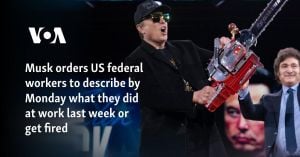Tech billionaire Elon Musk has ignited considerable controversy within federal agencies following his unprecedented directive manding millions of federal employees to justify their weekly productivity. Musk, who has recently taken charge of the newly formed Department of Government Efficiency (DOGE), sent out emails requiring employees to report their work accomplishments from the previous week or be treated as if they had resigned from their positions. This ultimatum has been met with rapid and fierce backlash from unions, government officials, and employees themselves.
The directive, communicated through the Office of Personnel Management (OPM), stated, "Failure to respond will be taken as a resignation," according to Musk’s message on X, the social media platform he oversees. This instruction has created confusion and dissent within the ranks of federal employees. Kash Patel, the recently appointed Director of the FBI, swiftly intervened by instructing all bureau employees not to answer Musk's email, emphasizing, "The FBI will conduct reviews... For now, please pause any responses," as reported by NBC.
Other agencies, including the Department of Defense (DoD) and the Department of Homeland Security (DHS), have echoed this sentiment. DHS Deputy Undersecretary R.D. Alles informed their employees, "No reporting action from you is needed at this time," reinforcing the notion of non-compliance with Musk's demand. This collective resistance from agencies highlights the growing concern over the legitimacy of Musk's directive and its legality.
Critics are also voicing their disdain on social media and on the floors of Congress. Congressman Sean Casten, representing Illinois, went so far as to encourage federal employees to initiate what he termed "mass civil disobedience" against Musk's ultimatum. He suggested employees prepare for pushback, stating, "Musk has no authority to do this." His call evokes the broader discontent felt within the federal workforce, as employees grapple with the pressures imposed by what they perceive as Musk’s overreach.
Legal ramifications are also surfacing, with unions filing lawsuits against the Trump administration, which has backed Musk’s initiative. These lawsuits assert the directives violate established laws governing federal employee responsibilities and performance reporting. Norm Eisen, representing the workers’ coalition, articulated concerns, claiming, "The patronizing demand... just adds insult to injury." The lawsuits aim to prevent any punitive action against workers who ignore the OPM instructions.
Musk defended his actions by framing them as necessary to determining the efficiency of federal employees. He hinted at the intention to assess whether jobs are truly mission-critical, stating, "This is just to see if the employee had a pulse and was capable of replying to an email." His perspective aligns with current trends aiming to decrease government bureaucracies and streamline operations—a narrative fervently supported by President Trump.
During Trump's recent Oval Office meeting, he expressed his enthusiasm for Musk’s plan, framing it as necessary for accountability. Trump suggested, "What he’s doing is saying, ‘Are you actually working?'" and claimed many non-responding employees might not even exist or may not be productive. This rhetoric positions Musk's actions within the broader conversation about government efficiency, albeit igniting significant pushback from existing structures.
The tension between Musk’s directives and agency policies highlights the challenges facing federal employees in obeying dual directives from management and individual agency heads. Reports show agencies including the Justice Department and the National Intelligence strongly discouraged their employees from providing the requested information. For example, DOJ employees were explicitly informed, "Due to the confidential nature of the Department’s work, DOJ employees do not need to respond to the email from OPM."
Despite the backlash, Musk’s team appears undeterred, employing measures such as incorporating the employee responses about their work achievements to feed data to Artificial Intelligence systems aimed at evaluating job proficiency. This tactic raises eyebrows over privacy and data usage, prompting increased scrutiny over the ethicality of these measures.
The email directive is just one component of Musk’s sweeping efforts to restructure federal agencies and reduce overall employment numbers by as much as 10%, as previously indicated. Yet, as unions rally and employees resist compliance, the potential for legal and administrative chaos looms large. Critics argue this is indicative of Musk's style, mirroring his abrupt and controversial changes at Twitter, where employees were equally challenged on their productivity under scrutiny.
With the legal ramifications yet to fully play out, the dispute over Musk's directives is likely to continue making headlines. Federal employees, feeling the weight of possible job risk, contend with both institutional resistance and the demands posed by the tech mogul at the helm of significant bureaucratic changes. Amidst this turmoil, many are now questioning not only operations but also the direction of the federal workforce amid mounting external pressures for accountability and productivity. This incident exemplifies growing tensions as federal employees navigate the complex intersection of efficiency, accountability, and their own job security.



